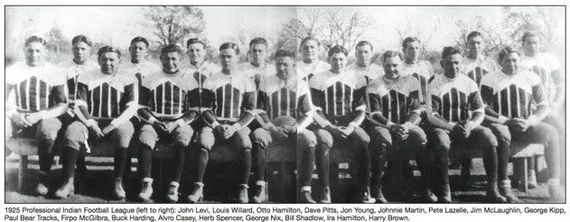Sports fans who tuned in to last Thursday night's primetime game between the New York Giants and Washington Redskins may have thought they were just watching the latest installment of one of football's oldest rivalries, one that has seen the Giants pull out a victory nearly 100 times. But the rivalry between the Giants and teams named for Native Americans is older than you might think. And despite the one-sided nature of Thursday's nationally televised game, the outcome hasn't always gone the New Yorkers' way.
The 45-14 shellacking that the Giants put on the Redskins came in the midst of a renewed fervor over the latter's team name, with everyone from the creators of TV's South Park to commentator Jon Stewart, to the President of the United States himself (who, by the way, lives in Washington), weighing in on whether the term "Redskins" is culturally insensitive to Native Americans. Team owner Dan Snyder has remained steadfast in his refusal to rename his team. But a new documentary has the potential to be the catalyst for a win-win agreement between both sides.
Filmmaker Celia Xavier's Playground of the Native Son tells the story of the Hominy Indians, an Oklahoma-based, multi-tribe team of American Indians that took on the world champion New York Giants in 1927, a full decade before the Redskins relocated from Boston to their current home in Washington, DC. The contest was played the day after Christmas, just three weeks after the Giants had won their first NFL title.
The Hominy Indians were financed by a pair of Osage brothers and featured John Levi, the team's star player and the man Jim Thorpe referred to as the greatest athlete to ever live. The traveling semi-professional squad laid waste to opponents in 26 consecutive games before taking the field against the world champions in a David-versus-Goliath game that no one expected them to win.
Only they did.
Nearly 90 years later, the game remains a watershed moment in Native American history, and is an amazing story of triumph that should be used to celebrate American Indians in football. This, along with the contention of some that the very sport of football was originally derived from the Native American game pahsaheman, is what people like Snyder should be using to support their desire to continue using a Native symbol for Washington's team.
As it stands, the Redskins' 1-3 start isn't even the most painful part of their 2014 season. Instead, the team has been dog-piled by bad publicity - even before the season began, news outlets were reporting that several broadcasters (including Phil Simms, who announced Thursday's game for CBS) were planning to refuse to use the team's name. Throughout September, articles have been turned out at a brisk pace, covering everything from the team allegedly selling expired beer at its home games to a movement to boycott FedEx, the company whose name adorns the Redskins' stadium.
The flimsy case for defending the name can be found on a Snyder-funded web site called Redskins Facts, but let's get real: much of the owner's refusal to change likely stems from both personal nostalgia (he grew up in the D.C. area) and business interests (it's no small task to rebrand an 82-year-old franchise). Many of his supporters may also be holding on for any variety of reasons, ranging from wanting to maintain a personal legacy to not wanting to have to buy new merchandise. Which would be ironic, since the federal government's recent decision to cancel the team's trademark registration would make it pretty easy to find unofficial Redskins swag for cheap. But it's not like Washington teams are any stranger to name changes - anyone know how the Bullets or Senators are doing this season? If anything, name changes are tradition for the city's teams.
Snyder could simply select a new name for the team that could still be Native American-oriented, which would allow him to make a genuine show of respect to the Native community while saving face with those who want him to remain obstinate. Embracing the story of the Hominy Indians could be the perfect solution for Snyder because it at once recognizes Native history and appeals to the football fanatics who love their team and don't want to see it lose its identity. This would also allow him to avoid having to admit any wrongdoing in insisting on holding onto something that has clearly offended many.
The timing couldn't be better, either, as Xavier's documentary (which features actual footage of the Hominy Indians in action) looks to be picking up steam. As it continues to attract sponsors and be screened nationwide - including an upcoming November showing at the Lincoln Center in New York City - she is planning a feature-film version of the story that is set to start shooting next year. A large-scale celebration of Native Americans' place in the history of the NFL would be the perfect time for Snyder to re-brand his team.
Rather than defend himself by relying on laughably out-of-date claims such as "Prominent Indian leaders of the 19th century... referred to themselves as 'Red-Skins,'" as the Redskins Facts site asserts, Snyder should use the Hominy Indians' story as the jumping-off point for the next chapter in his team's illustrious history. Either that, or just keep insisting that, no matter how many people he's offended, he's not going to budge. Because, hey, that worked out great for Donald Sterling, right?

